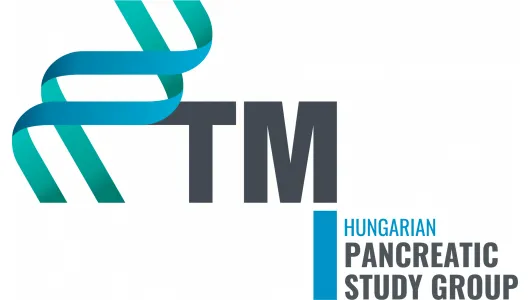
Hungarian Pancreatic Study Group
ACTIVITIES OF THE STUDY GROUP
1. Developing and maintaining the Registry for Pancreatic Patients
The registry was established for recording data of patients with pancreatic diseases and had received the ethical and biobank permission in 2012. (TUKEB-22254-1/2012/EKU and IF 702-19/2012). The enrollment of patients started in September 2012. Patients appearing with acute, chronic or autoimmune pancreatitis or pancreatic cancer are enrolled prospectively regardless their age. Patients are questioned about their medical history, complaints and symptoms. All answers and details from their electronic medical records (results of their examinations, details of their treatments in connection with their pancreatic disease) are uploaded to the registry. Samples of blood are stored in the Biobank.
There are more than 3500 patients in the Registry and 2800 blood samples in the Biobank. 101 centers have already joined, more than 50 actively enrolling patients and uploading data.
The number of patients in the Registry has been growing continuously thanks to the activity of institutions already contributing and also to institutions newly joining.
2. Planning and organizing observational clinical trials
The HPSG initiated three multicenter, observational clinical trials, namely: EASY for establishing an easily obtainable, accurate clinical scoring system that can stratify patients according to the severity of acute pancreatitis in the first 6-12 hours after admission, PINEAPPLE to establish a clinical scoring system to evaluate the necessity of pancreas enzyme test or imaging examination when a child appears at the emergency unit with abdominal pain and APPLE for exploring the course of pediatric pancreatitis and specify the genetic background of the disease.
All of these trials were presented and discussed on an international meeting, received the necessary ethical approvals and registered in the ISRCTN trial registry accepted by the WHO. The Scientific Committee of the International Association of Pancreatology has accepted all four trials to promote them among the members. An electronic CRF was developed for all of the trials and all documents, including protocols, patient informed consent forms, questionnaires, ethical permissions, are available on the HPSG website, not only in Hungarian, English and Russian, but also in several other languages. Beside the 49 Hungarian institutions, 53 foreign centers are also actively contributing to the trials.

3. Planning and organizing randomized controlled trials
Two randomized controlled trials were initiated, these are PREPAST to evaluate the role of preventive pancreatic stents at the early course of acute biliary pancreatitis and evaluating complications and overall outcome compared to the standard ERCP techniques and GOULASH for providing the first evidence concerning the necessity of early energy supply for patients suffering from acute pancreatitis.
4. Organizing the yearly international conference
The conference is an excellent occasion to involve international participants into the ongoing projects of the Hungarian Pancreatic Study Group. There are usually 120-150 participants mainly from Eastern and Central Europe but several other countries are interested from the Western part of Europe. Topics of the conference include: Importance of the International Pancreatic Registries and Biobank, Results from the Registries, Pancreatic Genetics, Preliminary Results of Running Prospective Clinical Trials, Discussion of New Clinical Trials, Education for Clinical Research Administrators, Free Presentations. Sponsors of the HPSG have the opportunity represent themselves at the conference.
5. Adapting evidence based guidelines
In 2014 The Hungarian Pancreatic Study Group proposed to prepare Evidence Based Guidelines for the management of acute pancreatitis, chronic pancreatitis, autoimmune pancreatitis, pancreatic cancer and pediatric pancreatitis. The international guidelines were translated and completed or modified where it was necessary by the preparatory and consultant team appointed by the HPSG. The guidelines were presented, discussed and accepted on a consensus meeting held on 12th September 2014.
6. Educating young doctors and students
The HPSG is committed to improve the lives of patients suffering from pancreatic diseases. To disseminate the EBM guideline for pancreatic diseases, the HPSG printed a hard copy of the published Hungarian guidelines. The book is available at the conferences and can be ordered directly from the study group. As the compliance to the guidelines are crucial for a better management of the diseases, the HPSG is organizing training courses and presentations at conferences and at universities.
7. Developing patients club for pancreatic patients
The aim of our activity is to create a community, where pancreatic patients can get all information concerning their disease while having their interest advocated. We think it is important, that our patients can ask for our help and advice as an outpatient, too. This way, they get professional answers for all of their questions. We maintain contact through newsletters, presentations and club meetings.